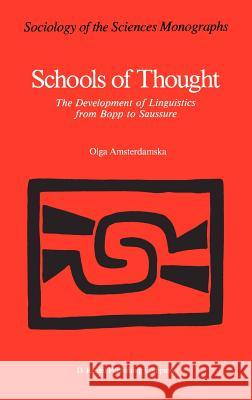Schools of Thought: The Development of Linguistics from Bopp to Saussure » książka
Schools of Thought: The Development of Linguistics from Bopp to Saussure
ISBN-13: 9789027723918 / Angielski / Twarda / 1987 / 322 str.
Schools of Thought: The Development of Linguistics from Bopp to Saussure
ISBN-13: 9789027723918 / Angielski / Twarda / 1987 / 322 str.
(netto: 766,76 VAT: 5%)
Najniższa cena z 30 dni: 771,08
ok. 22 dni roboczych
Bez gwarancji dostawy przed świętami
Darmowa dostawa!
This book is based on the assumption that the development of science has to be understood both as a social and as an intellectual process. The division between internal and external history, between history of ideas and sociology of science, has been harmful not only to our understanding of scientific rationality but also to our understanding of the social processes of scientific development. Just as philosophy of science must be informed by its history, so also must sociology of science be both historically and philosophically informed. Proceeding on this assumption, I examine in detail the contents of linguistic ideas and the changes they underwent, as well as the institutional processes of disciplinary development and school formation. The development of linguistics in the nineteenth and early twentieth centuries has provided me with a convenient locus for a study of the processes of cognitive change and continuity in the context of modern academically institutionalized science. This book examines first the idea system and the institutionalization of historical and comparative linguistics in the first half of the nineteenth century, and then focusses on the for mation and development of three schools of thought: the Neogrammarians, the Neo-Idealists, and the Geneva School of Ferdinand de Saussure.











